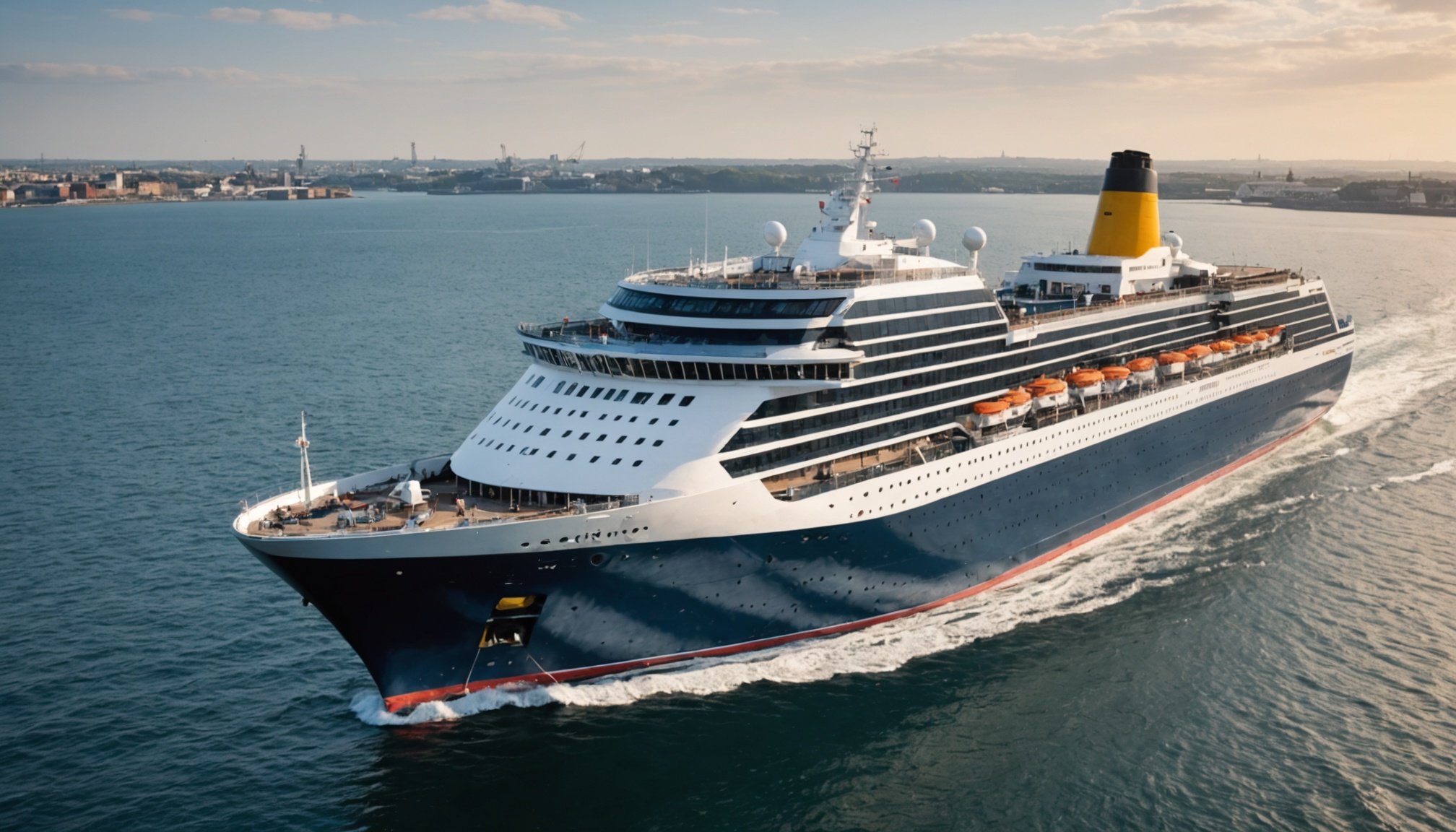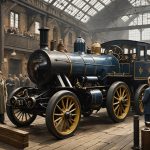The UK boasts a remarkable maritime heritage, rich with stories of innovation and craftsmanship. Exploring the top cruises dedicated to British shipbuilding reveals not only stunning landscapes but also a tapestry of history that shaped the nation. From the bustling docks of Portsmouth to the iconic shipyards of Glasgow, these journeys provide an immersive experience of the legacy left by generations of shipbuilders. Join us as we uncover the most captivating cruises that celebrate this vital aspect of British history.
Overview of British Maritime Heritage
British maritime history is a tapestry woven with tales of exploration, trade, and naval dominance. At its core lies the shipbuilding legacy that propelled the United Kingdom to the forefront of global maritime power. Historically, the UK has been home to some of the world's most renowned shipyards, responsible for crafting iconic vessels that have sailed the seas for centuries.
In the same genre : Your Ultimate Guide to Selecting a UK Cruise with Enchanting Guided Tours of Historic British Pubs
The maritime heritage of the UK is rich and varied, encompassing everything from the majestic ships of the Royal Navy to the humble fishing boats that have plied local waters for generations. This legacy is not just about the vessels themselves, but also the innovations in navigation and maritime engineering that have emerged from British shores.
Exploring this heritage through UK cruises offers a unique perspective. Cruises allow visitors to experience historical sites such as Portsmouth Historic Dockyard or the Titanic Belfast, where they can delve into the stories behind these iconic ships. These journeys provide an immersive experience, allowing travellers to connect with the past while enjoying the beauty of Britain's coastal landscapes. Through these voyages, the rich tapestry of Britain's maritime history comes alive, offering insights into the nation's pivotal role in shaping the seas.
Also read : Sail through paradise: full day cruise boat rental in st barths
Top UK Cruises Focused on Shipbuilding History
Exploring the best UK cruises dedicated to shipbuilding history offers a fascinating journey through time. These historical cruises are meticulously curated to provide an immersive experience into Britain's rich maritime past. They often feature itineraries that highlight significant shipbuilding locations, allowing travellers to delve deeper into the United Kingdom's maritime legacy.
Key Itineraries and Experiences
- Portsmouth Historic Dockyard: Many maritime tours include this iconic site, home to historic ships like HMS Victory and HMS Warrior.
- Titanic Belfast: A must-visit for those interested in shipbuilding, this museum offers insights into the construction of the legendary Titanic.
- Clydebank: Known for its shipyards, Clydebank is often featured in itineraries for its role in crafting famous liners like the Queen Mary.
Cruise Operators Comparison
Several cruise operators specialise in these experiences, each offering unique perspectives on British maritime history. Some focus on luxury, providing a more leisurely exploration, while others offer educational tours with expert-led discussions. When choosing among these operators, consider the depth of historical content offered and the quality of onboard amenities. Each operator provides a distinct way to connect with Britain's shipbuilding heritage, ensuring a memorable and enlightening voyage.
Historical Sites to Explore on Your Cruise
Exploring maritime museums and shipyards provides a captivating glimpse into British shipbuilding history. These sites offer a deeper understanding of the UK's maritime heritage.
Notable Shipyards
- Clydebank: Renowned for its shipbuilding prowess, Clydebank was home to the creation of legendary liners like the Queen Mary. Visitors can witness the remnants of its industrial past and appreciate the craftsmanship that defined an era.
Maritime Museums
-
Portsmouth Historic Dockyard: This museum is a treasure trove for maritime enthusiasts. It houses the HMS Victory and HMS Warrior, offering insights into naval warfare and shipbuilding techniques that propelled Britain to maritime supremacy.
-
Titanic Belfast: This iconic museum provides an immersive experience into the construction of the Titanic. It showcases the shipbuilding innovations and challenges faced during its creation, making it a must-visit for history buffs.
Other Historical Landmarks
- Greenwich: Home to the Royal Observatory and the National Maritime Museum, Greenwich is rich in maritime history. These landmarks highlight Britain's navigational advancements and its role in global exploration.
These sites collectively narrate the story of Britain's maritime legacy, offering visitors a comprehensive understanding of its historical significance.
Insight into British Shipbuilding Heritage
Delving into the shipbuilding techniques of the UK reveals a fascinating blend of tradition and innovation. British shipyards have long been celebrated for their craftsmanship, employing methods that have stood the test of time. From the use of robust oak timbers in the early days to the introduction of iron and steel, these techniques have evolved, reflecting advancements in maritime engineering.
Among the famous ships crafted in the UK, the HMS Victory stands out. Built in the 18th century, this ship played a pivotal role in the Battle of Trafalgar and remains a testament to British naval prowess. Another iconic vessel, the RMS Titanic, was constructed at the Harland and Wolff shipyard in Belfast. Its tragic maiden voyage has captivated the world, highlighting both the grandeur and perils of shipbuilding.
The UK has been at the forefront of maritime innovation, introducing groundbreaking technologies such as steam propulsion and advanced hull designs. These innovations have not only enhanced the efficiency and safety of vessels but have also cemented Britain's status as a leader in maritime engineering. This rich heritage continues to inspire and influence modern shipbuilding practices.
Unique Onboard Experiences Related to Shipbuilding
Embarking on a cruise focused on British maritime heritage offers more than scenic views; it provides a gateway to maritime education through unique cruise activities. These cruises often feature onboard workshops that delve into the intricacies of shipbuilding. Passengers can attend lectures by maritime historians, gaining insights into the evolution of shipbuilding techniques and the cultural significance of iconic vessels.
Thematic events celebrating British maritime culture are a highlight. These events might include reenactments of historical naval battles or exhibitions showcasing maritime artefacts. Such activities not only entertain but also educate, offering a deeper understanding of Britain's maritime legacy.
For those eager for hands-on learning, some cruises offer opportunities to engage directly with shipbuilding processes. Workshops might include model shipbuilding sessions or demonstrations of traditional craftsmanship techniques. This interactive approach allows passengers to appreciate the skill and artistry involved in creating the vessels that once dominated the seas.
These experiences collectively enrich the cruise journey, providing passengers with a comprehensive understanding of Britain's shipbuilding heritage while enjoying the comforts of modern maritime travel.
Traveler Testimonials and Recommendations
Embarking on a cruise to explore Britain's shipbuilding history is a journey filled with discovery and awe. Traveler experiences often highlight the profound connection felt with the maritime past. Many recount their visits to iconic sites like the Portsmouth Historic Dockyard, where the grandeur of HMS Victory left them in awe. These personal stories emphasize the cruise's ability to bring history to life, offering a unique lens into the United Kingdom's maritime legacy.
When it comes to cruise reviews, travelers frequently recommend engaging with onboard lectures and workshops. These activities deepen understanding and appreciation of the shipbuilding techniques that once dominated the seas. For an enriched experience, consider participating in thematic events that celebrate British maritime culture.
To make the most of your cruise, seasoned travelers offer several tips for cruisers. Packing essentials include comfortable walking shoes for exploring shipyards and museums, and a journal to document your journey. Layered clothing is advisable, given the variable British weather. Additionally, bringing along a camera ensures you capture the breathtaking coastal landscapes and historical landmarks. These recommendations aim to enhance your cruise experience, ensuring it is both enlightening and enjoyable.
Cruise Operators Specializing in Historical Itineraries
Embarking on a journey through time is made possible by cruise companies dedicated to historical itineraries. These historical cruise operators offer a unique opportunity to explore maritime travel with a focus on Britain's rich shipbuilding history. Each operator provides distinct experiences, ensuring that travellers can immerse themselves in the past while enjoying modern comforts.
These specialized cruise companies often include features such as expert-led lectures, themed events, and visits to significant maritime sites. Onboard amenities are tailored to enhance the historical journey, with libraries stocked with maritime literature and workshops that allow passengers to engage with shipbuilding techniques. Some operators even offer exclusive behind-the-scenes tours of shipyards and museums, providing a deeper understanding of the maritime legacy.
Booking a cruise with these operators is straightforward, but there are a few tips to ensure a seamless experience. Early booking is recommended, as these cruises are popular and often fill up quickly. Customer service can be a valuable resource, offering insights into itinerary details and helping tailor the journey to individual interests. By choosing the right operator, travellers can enjoy a memorable and enlightening voyage through Britain's maritime history.
Duration and Planning Your Historical Cruise
Embarking on a historical cruise focused on Britain's shipbuilding legacy requires careful trip planning to ensure a rewarding experience. The typical cruise duration for these themed voyages ranges from 7 to 14 days, allowing ample time to explore the rich maritime heritage.
When planning your itinerary, consider the itinerary details that highlight key historical sites. Prioritise visits to iconic locations like Portsmouth Historic Dockyard and Titanic Belfast. These sites offer profound insights into Britain's maritime history, making them essential stops on your journey.
The best times of year to book these cruises are during the late spring and early autumn. These seasons offer milder weather, enhancing your exploration of outdoor shipyards and coastal landscapes. Additionally, booking during these periods often means fewer crowds, allowing for a more intimate experience at popular attractions.
To maximise your cruise experience, research the cruise operators' offerings in detail. Look for those that provide expert-led lectures and thematic events, enriching your understanding of shipbuilding history. By aligning your itinerary with your interests, you ensure a journey that is both enlightening and enjoyable.
Essential Tips for Exploring Maritime Heritage
Embarking on a cruise dedicated to historical exploration requires thoughtful preparation. To ensure a seamless journey, consider these travel tips.
First, focus on cruise preparation by packing essentials for comfort. Layered clothing is crucial, as the British weather can be unpredictable. Comfortable walking shoes will make exploring historical sites more enjoyable. Don't forget a camera to capture the stunning coastal views and significant landmarks.
Engaging with local history at ports of call enriches the experience. Before arrival, research the historical significance of each destination. This preparation allows you to appreciate the stories behind each site, whether it's a shipyard or a maritime museum. Engaging with local guides can provide deeper insights and enhance your understanding of the UK's maritime legacy.
For added convenience, consider bringing a lightweight backpack to carry essentials during excursions. A journal is also valuable for documenting your observations and reflections on the journey. These travel tips ensure that your cruise not only offers comfort but also a profound connection to Britain's rich maritime history. With the right preparation, your exploration will be both enlightening and memorable.
Conclusion and Additional Resources
For those eager to delve deeper into the maritime heritage of Britain, a wealth of maritime resources awaits exploration. These resources offer an enriching perspective on the shipbuilding history that has shaped the nation.
Engaging with further reading is a great starting point. Books such as "The Shipbuilders of the Clyde" and "Britain's Maritime Heritage" provide detailed insights into the craftsmanship and innovation that drove British shipbuilding. These works are complemented by documentaries like "The Great British Shipyard" which visually narrate the evolution of shipbuilding techniques over the centuries.
For a more interactive exploration, numerous online resources offer virtual tours and archives. Websites like the National Maritime Museum provide access to extensive collections and historical records, perfect for those wishing to explore from the comfort of home.
Local organizations play a pivotal role in preserving this history. Groups such as the Maritime Heritage Trust and the Clyde Maritime Trust actively work to maintain historical sites and educate the public. These organizations often host events and exhibitions, providing opportunities for hands-on learning and engagement with Britain's maritime legacy. By leveraging these resources, individuals can deepen their understanding and appreciation of the UK's rich shipbuilding heritage.
















